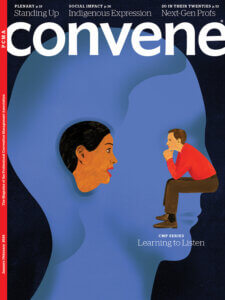
“There are a lot of useful places to give advice, but just not as often or as early as you think,” said Michael Bungay Stanier, who will give the opening keynote at Convening EMEA 2024.
Michael Bungay Stanier, author of The Coaching Habit: Say Less, Ask More & Change the Way You Lead Forever, is one of the world’s top experts on coaching. Founder of the Toronto-based learning and development company, Box of Crayons, in December, Stanier received the 2023 Coaching and Mentoring Award from Thinkers50, which ranks the leading management thinkers from around the globe. Stanier will be a keynote speaker at PCMA’s Convening EMEA 2024 in Barcelona, Sept. 30–Oct. 2.
Coaching is simple — and difficult, Stanier told Convene over Zoom. The key, he said, “is A, asking a good question, and then B, listening to the answer. It sounds straightforward, but it can be difficult to know which questions are the most useful to ask — and it can be difficult once you’ve asked a question, to be present and actually listen to the answer.”
Instead of paying attention during conversations, we often fake-listen and go straight to: “I know what the problem is and I have some opinions,” Stanier said. “We’re just waiting to give advice.” The urge to immediately offer up answers and opinions — what Stanier calls the “Advice Monster” — is understandable, he said. Beginning in school, we’re trained to think that our value is gauged by the quality of our answers, he said. “It’s no wonder that when you get out of school, you think: ‘My job is to have the right answers.’” And more than that, he said, “When we’re the person giving the answers, we have more status and control, and we feel we’re more important. It’s clear that we’re adding value.”
But when we rush to give advice, we forego the opportunity to understand what’s going on at a deeper level and may entirely miss what the actual challenges and problems are, he said. Stanier traces his insights into the power of listening attentively to when, as a student at Oxford University, he volunteered as counselor for a crisis telephone line for local youth. There he learned not only to ask good questions, but “to be curious, and to assume that what’s on the surface isn’t the whole story — or even the real story,” he said. “I have this really clear memory of [thinking] ‘Oh, there are other levels of conversation that are running under the surface and my job is to try and get closer to the truth of the matter.’ That’s where the seed was planted for me to realize that my advice is not as good as I think it is.”
Most of the time when somebody comes to you with a problem, “they don’t really want your advice, they want you to help them figure it out for themselves,” he said. “There are a lot of useful places to give advice, but just not as often or as early as you think.”

Michael Bungay Stanier
A lot of managers don’t want to be coaches — they just want to do their jobs, Stanier said. “But being more coach-like is a leadership behavior. The key behavior change is this: Can you stay curious a little bit longer? Can you rush to action and advice-giving a little bit more slowly? It’s not ‘never give advice’ and it’s not ‘don’t do anything.’ But stay curious a little bit longer.”
“It’s a learned skill to ask questions and wait for the answers,” he said. “You’re giving up status because you are saying to the other person, ‘You come up with the answer.’ You’re making yourself less important and you’re making the other person more important. This, of course, is the definition of empowerment — that’s what empowerment looks like and sounds like.”
What is the upside for managers, Convene asked Stanier, who are able to step out of the role of the person with all the answers?
Managers who train their staff to always come to them for the answers find themselves with too much work, he said. “What a great manager does is push responsibility and accountability to the right level of the people on their team. When you can become the person who is brilliant at helping people figure out what the real problem is, rather than the person your team relies on for the answers, that is very empowering and liberating for them and for you.”
Seven Questions Worth Asking
In The Coaching Habit, Stanier offers a list of questions designed to help break the advice-giving habit and lead the way toward work that has more impact. The caveat, he writes, is “you have to actually listen to the answers.”
- What is on your mind?
- And what else?
- What is the real challenge here for you?
- What do you want?
- If you’re saying yes to this, what must you say no to?
- How can I help?
- What is most useful or valuable here for you?
Barbara Palmer is deputy editor at Convene.
- REGISTER NOW for Convening EMEA 2024
 Listen Up
Listen Up
This article and those listed below are part of Convene’s January/February 2024 issue cover and CMP Series story package.
